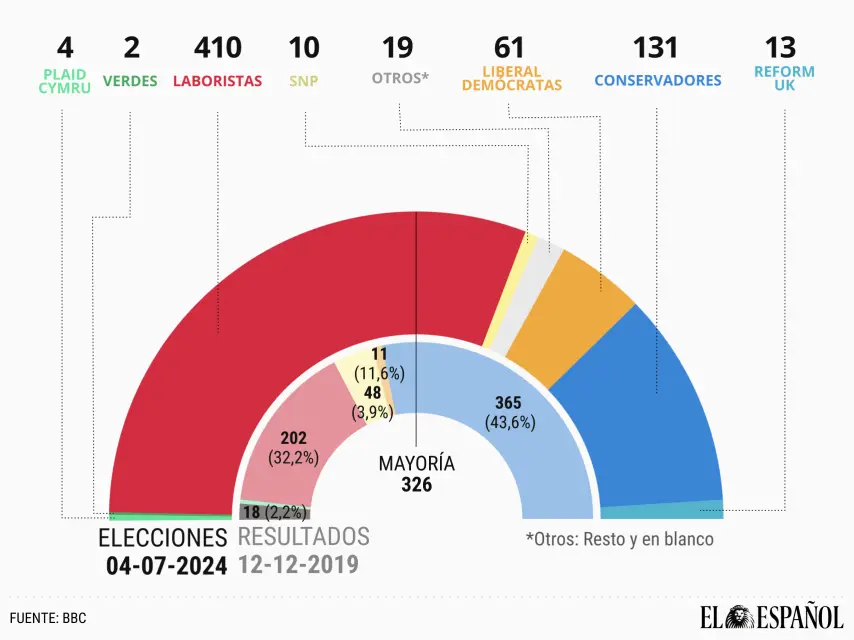The Labour Party Keir Starmer will be the next Prime Minister of the United Kingdom. The exit polls of the parliamentary elections held this Thursday in the island country give the party a wide majority over the Conservatives of Prime Minister Rishi Sunak, who have suffered historic losses. According to the poll, Labour would obtain 410 seats in the 650-seat Parliament and a majority of 170 in advantage, ending 14 years of Conservative government and giving the Labor Party its best results since the election of Tony Blair in 1997.
Labour’s victory was already predicted when Sunak dissolved parliament and called elections last May. The Conservative Party had just suffered the biggest coup in its history at the polls after a setback in the municipal elections. Voter discontent with the ruling party was caused by the incessant rise in the cost of living, years of instability in governments Tories and infighting that has seen five different prime ministers since 2016. “Britain’s future was at the ballot box in this election. And, if we are successful tonight, Labour will immediately get to work on our first steps for change,” said Pat McFadden, Labour’s campaign coordinator, in a statement.
The centrist Liberal Democrats are expected to win 61 seats, while the right-wing populist Reform UK party, led by the activist Brexit Nigel Farage, would win 13. Although the forecast for Reform is much better than expected, the overall result suggests that the British public has decided to translate its disenchantment into support for the centre-leftThis suggests a stark departure from the trend across the Channel: last Sunday, the far-right National Rally party, led by Marine Le Pen, made historic gains in France’s legislative elections.

Results of Thursday’s general elections in the United Kingdom according to exit polls.
The British elections this Sunday do not only mean the collapse of the Conservatives. The pro-independence party is predicted to win Scottish National Party only won 10 seats, its worst result since 2010. After a period of turmoil that has seen two leaders resign in just over a year, a police investigation into the party’s finances has been launched and divisions have emerged over various policies.
In the last six British elections, only one exit poll has gotten the result wrong: in 2015, when the poll predicted a hung parliament and the Conservatives actually won a majority. The official results will be announced in the next few hours.
To everyone who campaigned for Labour in this election, to everyone who voted for us and put their trust in our changed Labour Party – thank you. https://t.co/q6yDNPnAbo
— Keir Starmer (@Keir_Starmer) July 4, 2024
A disastrous campaign
Sunak surprised Westminster and many in his own party by calling the election at a time when the Conservatives were trailing Labour by around 20 points in opinion polls. The prime minister had hoped the gap would narrow, as has traditionally happened in British elections, but the party’s disastrous campaign has done a disservice to the right’s popularity crisis.
Immediately after the announcement, a scandal involving suspicious betting on the election date engulfed Conservative aides and candidates. Later, Sunak’s early departure from the events marking the election Normandy’s landing in France to do a television interview angered army veterans, and even those in his own party said it raised questions about his political acumen.
[Las bolsas suben y la libra avanza: “Los mercados ven con buenos ojos el triunfo laborista en Reino Unido”]
If the exit poll backs Starmer, it will be an incredible turnaround for Labour, which critics and supporters say was facing an existential crisis just three years ago when it lost a parliamentary seat by 16% to the Conservatives, a near-unique victory for a governing party.
At the time, a series of scandals – most notably revelations about parties in Downing Street during the COVID lockdowns – undermined the then prime minister. Boris Johnsonand in November 2021 the Conservatives’ lead in the polls, which had been higher than at any time during Margaret Thatcher’s 11-year rule, plummeted.
Following Johnson’s forced departure at the end of 2022, the disastrous six-week term of Liz Truss consolidated the decline of the traditional British right. Since then, Sunak has been unable to gain points on Labour’s overwhelming lead in the polls, which today materialized in the first victory of the left in fourteen years.













Add Comment